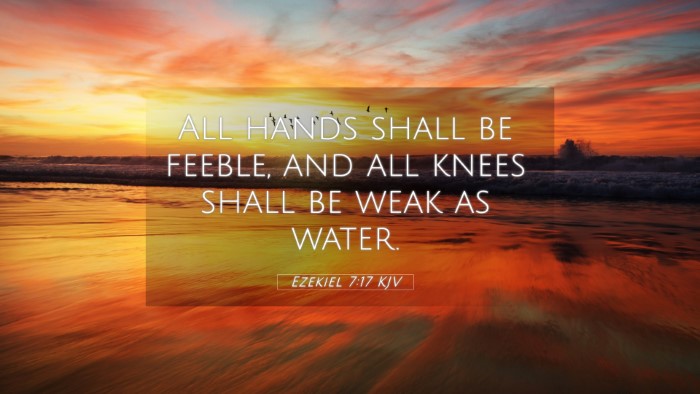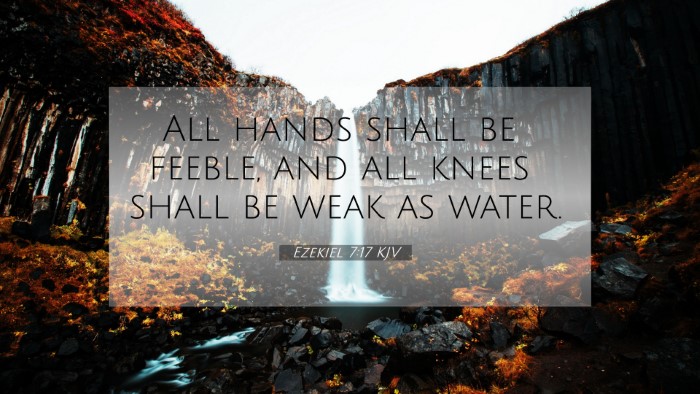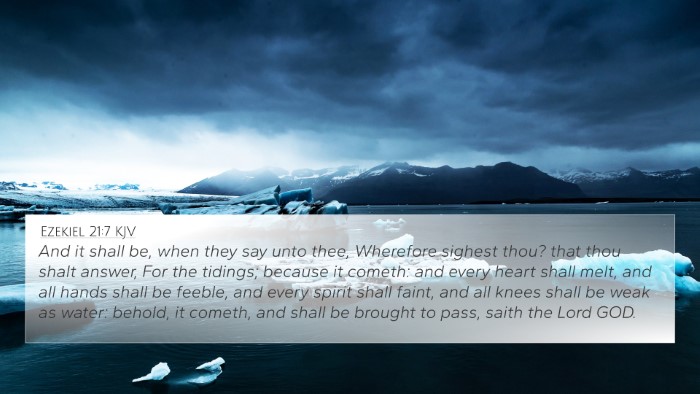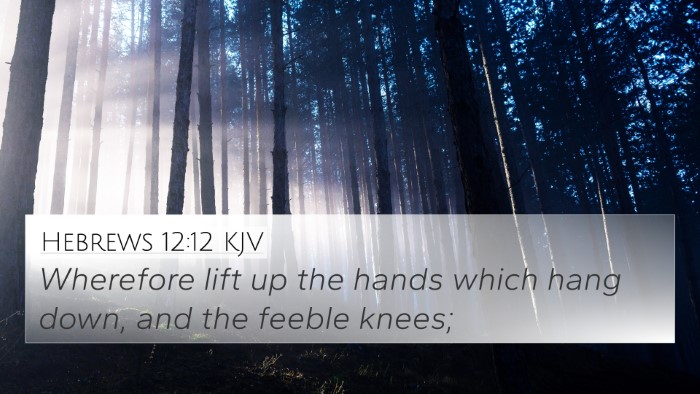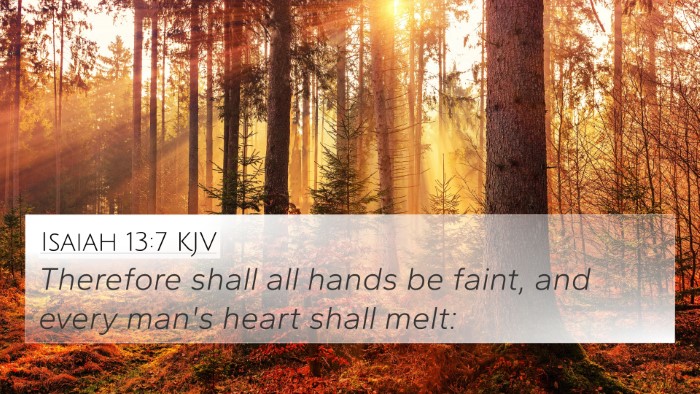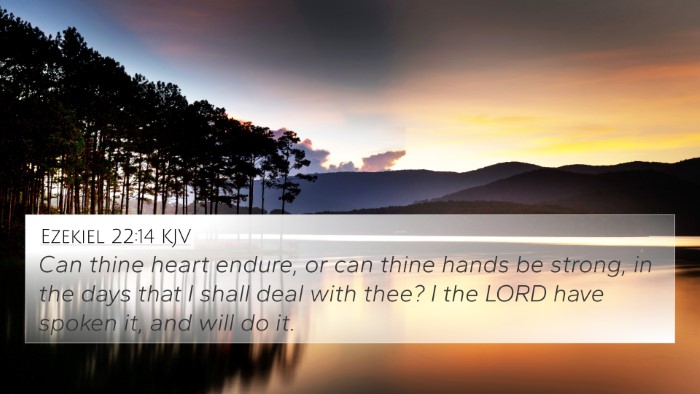Ezekiel 7:17 - Verse Meaning and Insights
The verse Ezekiel 7:17 states:
"All hands shall be feeble, and all knees shall be weak as water."
This passage encapsulates the dire circumstances and spiritual desolation awaiting the people of Israel as they face impending judgment. Below, we provide a comprehensive analysis of this verse based on insights from respected public domain commentaries, including those by Matthew Henry, Albert Barnes, and Adam Clarke.
Summary of Theological Insights
This verse highlights the profound fear and helplessness of the people amidst their impending doom. The imagery of weakened hands and trembling knees illustrates a total loss of strength and stability, both physically and spiritually.
1. Commentary Insights
- Matthew Henry: Henry notes that the feebleness of hands and knees symbolizes the inability of the people to fight back against God's judgment. It reflects their internal state of fear and the inability to act in their own defense, showing a contrast between human frailty and divine authority.
- Albert Barnes: Barnes emphasizes that the expression signifies utter despair. He elaborates that as the judgment draws near, the natural reactions of fear lead to paralysis, rendering the people incapable of movement, illustrating their complete surrender to the consequences of their actions.
- Adam Clarke: Clarke offers a nuanced interpretation, observing that the verse serves as a reminder of the consequences of sin and rebellion against God. He points out that this physical failure represents a spiritual state of being, where the soul is weighed down by guilt and fear of judgment.
2. Thematic Connections
The verse serves as a poignant reminder of God's righteous judgment and the fear that accompanies it. Several biblical themes are interwoven with this text, including:
- Human frailty in the face of divine authority.
- The consequences of sin leading to despair and paralysis.
- The call to repentance and the need for spiritual renewal.
3. Cross-References for Ezekiel 7:17
To deepen our understanding of this verse, here are several Bible cross-references that support its themes:
- Isaiah 35:3-4: "Strengthen ye the weak hands, and confirm the feeble knees." This passage emphasizes the act of strengthening those who are weak, contrasting the weakness described in Ezekiel.
- Jeremiah 30:6: "Ask ye now, and see whether a man doth travail with child. Wherefore do I see every man with his hands on his loins, as a woman in travail..." This verse captures the sense of fearful anticipation and laboring under distress.
- Habakkuk 3:16: "When I heard, my belly trembled; my lips quivered at the voice." This depicts a similar physical reaction to the announcement of judgment and terror.
- Psalms 119:120: "My flesh trembles for fear of thee; and I am afraid of thy judgments." This verse reflects a personal reaction of fear before God's judgments, corresponding to the trembling of hands and knees.
- Lamentations 5:17: "For this our heart is faint; for these things our eyes are dim." Here we see the connection between despair and spiritual weakness.
- John 14:27: "Peace I leave with you; my peace I give unto you: not as the world giveth, give I unto you." This offers a contrast to the fear and trembling discussed in Ezekiel.
- Revelation 1:17: "And when I saw him, I fell at his feet as dead..." This shows the powerful impact of divine presence, illustrating human inadequacy when faced with God.
- Matthew 26:41: "Watch and pray, that ye enter not into temptation: the spirit indeed is willing, but the flesh is weak." This highlights the weakness of humanity in spiritual battles.
- Romans 7:24: "O wretched man that I am! who shall deliver me from the body of this death?" Paul conveys the despair of the flesh, which resonates with the weakness described in Ezekiel.
4. Practical Applications
The themes found in Ezekiel 7:17 can guide us in several ways:
- Awareness of Sin: Acknowledging our weaknesses and the consequences of our actions can encourage humility and repentance.
- Seeking Strength in God: Understanding our frailty prompts us to seek divine strength through prayer and reliance on God's promises.
- Community Support: As individuals and communities, we can support those who are struggling by offering encouragement and prayer.
5. Conclusion
Ezekiel 7:17 serves as a powerful reminder of human frailty in the face of divine judgment. By examining this verse alongside cross-referenced texts and drawing from public domain commentaries, we uncover a deeper understanding of its meaning and implications. The exploration of human weakness, the need for repentance, and the assurance of God's power offer profound lessons for spiritual growth.
6. Further Study Resources
For those interested in delving deeper into the connections between Bible verses, consider utilizing the following tools:
- Bible Concordance: A comprehensive resource for finding specific verses and their themes.
- Bible Cross-Reference Guide: Useful for linking scriptures that speak to similar themes and messages.
- Bible Cross-Reference System: Helps in systematic studying and understanding the connections between texts.
In conclusion, Ezekiel 7:17, when viewed through the lens of its thematic and scriptural connections, reveals significant insights into human nature, judgment, and divine grace. By engaging in comparative Bible verse analysis or utilizing tools for cross-referencing, readers can enhance their understanding of scripture and its interwoven messages.

